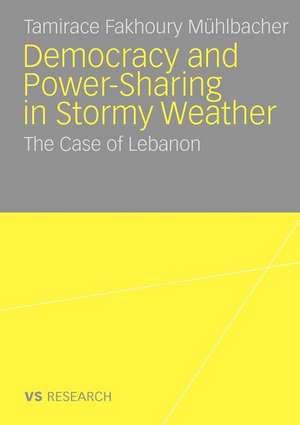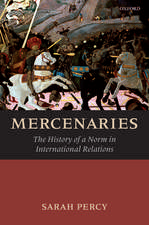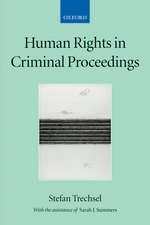Democratisation and Power-Sharing in Stormy Weather: The Case of Lebanon
Autor Tamirace Fakhoury Mühlbacheren Limba Engleză Paperback – 26 aug 2009
Preț: 394.51 lei
Nou
Puncte Express: 592
Preț estimativ în valută:
75.50€ • 81.98$ • 63.42£
75.50€ • 81.98$ • 63.42£
Carte tipărită la comandă
Livrare economică 23 aprilie-07 mai
Preluare comenzi: 021 569.72.76
Specificații
ISBN-13: 9783531165295
ISBN-10: 3531165291
Pagini: 480
Ilustrații: 480 p. 14 illus.
Dimensiuni: 148 x 210 x 29 mm
Greutate: 0.57 kg
Ediția:2009
Editura: VS Verlag für Sozialwissenschaften
Colecția VS Verlag für Sozialwissenschaften
Locul publicării:Wiesbaden, Germany
ISBN-10: 3531165291
Pagini: 480
Ilustrații: 480 p. 14 illus.
Dimensiuni: 148 x 210 x 29 mm
Greutate: 0.57 kg
Ediția:2009
Editura: VS Verlag für Sozialwissenschaften
Colecția VS Verlag für Sozialwissenschaften
Locul publicării:Wiesbaden, Germany
Public țintă
ResearchCuprins
Introductory Overview.- Review and Critique of the Literature on Consociational Democracy.- Pre-War Lebanon: a Dance into the Abyss of Consociationalism.- Post-War Lebanon: The Lost Republic’s Peregrinations.- Post-War Lebanon’s Long and Perilous Road to Democracy.- What about Post-War Consociationalism?.- Final Appraisal.
Notă biografică
Dr. Tamirace Fakhoury Mühlbacher completed her doctoral studies at the Department of Politics at the Albert-Ludwigs University in Freiburg and at the Arnold Bergstraesser Institute. She is a researcher and the coordinator of the socio-political module of the CARIM Project at the European University Institute in Florence, Italy.
Textul de pe ultima copertă
Since the inception of the fragile nation-state in 1943, Lebanon has been faced with the constantly unstable predicament of being torn between Middle Eastern and Western orbits. After examining Lebanon’s pre-war consociational democracy as well as the factors behind its collapse in 1975, Tamirace Fakhoury Mühlbacher analyses the post-war order (1990-2006) by shedding light on both interrelated phenomena: communal power-sharing in a turbulent environment and Lebanon’s “hybrid democratisation” between Syrian tutelage and the impulses for more liberalisation against the backdrop of exogenous and endogenous factors. The author analyses in detail Lebanon’s uncertain 2005 system transition, the so-called 'Beirut Spring', and its aftermath. In a critical perspective, she highlights fundamental communal and political dynamics that result from the collision of internal and external conflict lines on Lebanese ground, and how the former have impeded balanced power-sharing and democratisation in the small Arab Republic.
This book is essential reading for researchers and students from the social sciences, in particular sociology and political science.
This book is essential reading for researchers and students from the social sciences, in particular sociology and political science.
Caracteristici
The Case of Lebanon











